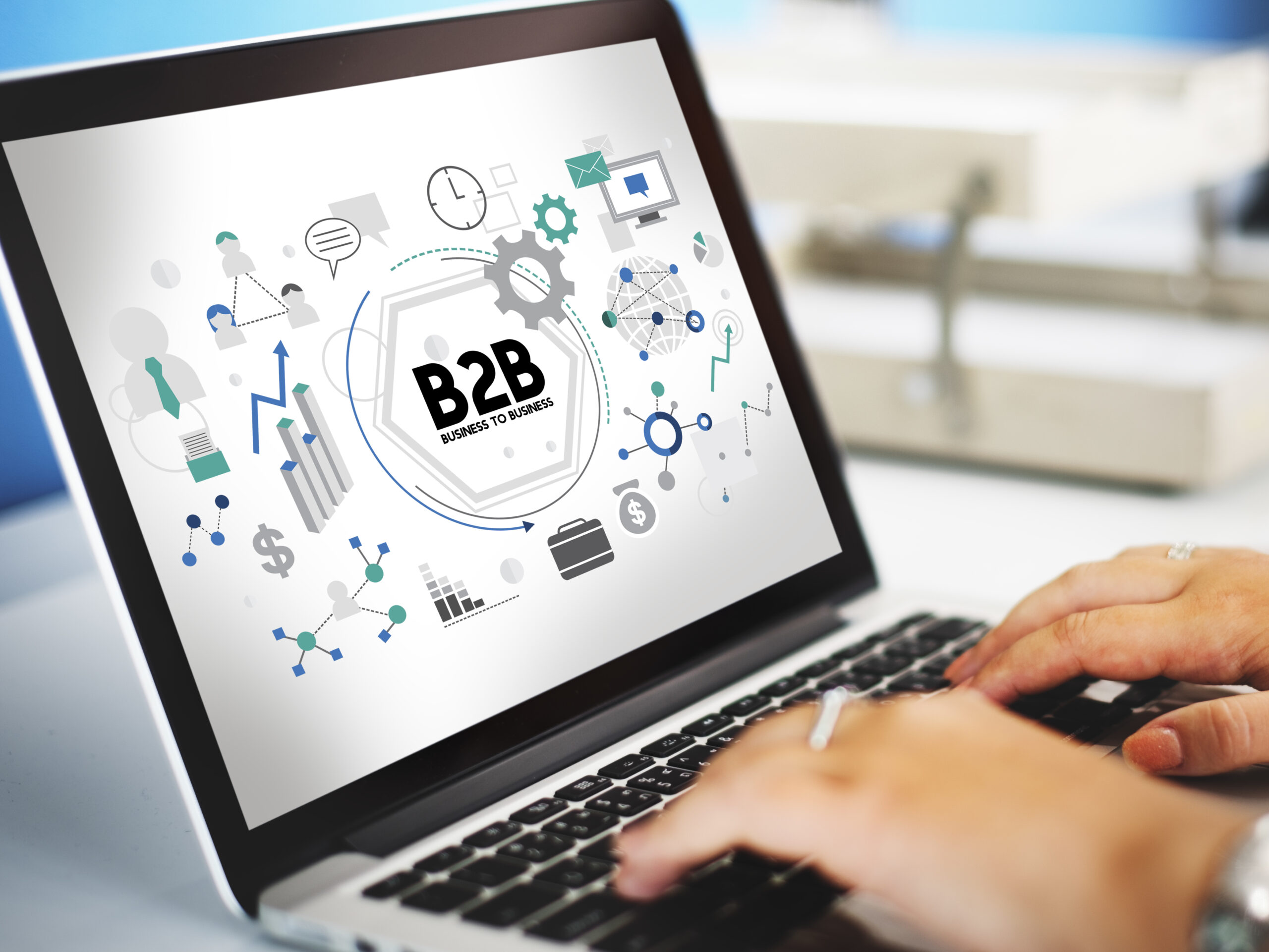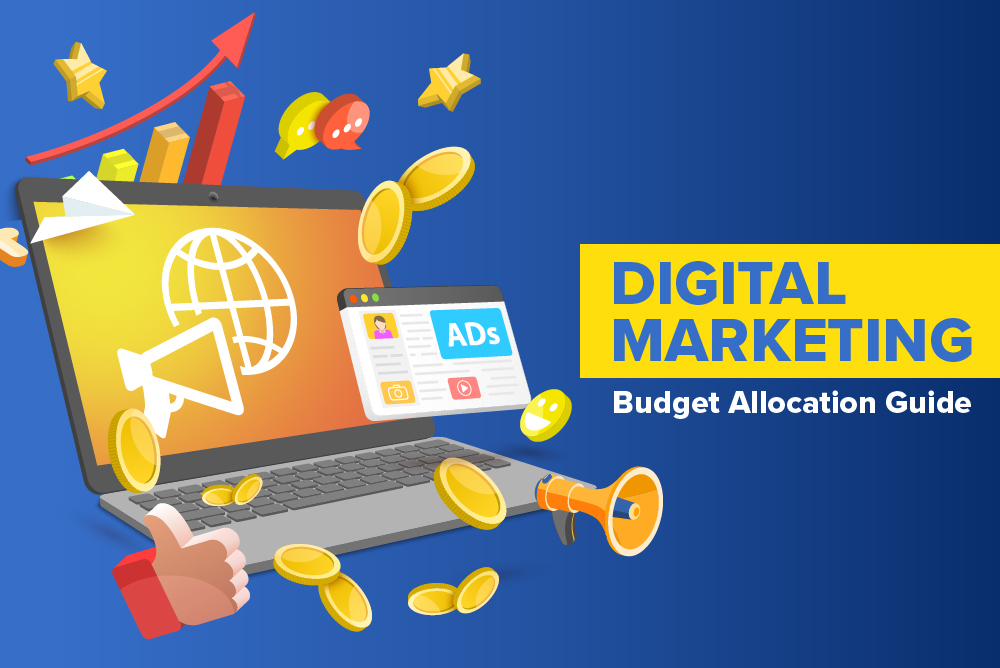B2B digital marketing is now a must-have for businesses aiming to connect with other companies. Unlike B2C marketing, which targets individual consumers, B2B digital marketing zeroes in on the unique needs of organisations, targeting the decision-makers within a company.
B2B marketing also leverages many of the same digital channels you would find in B2C marketing, from social media to email marketing, SEO and more, to reach and engage potential business clients. However, the specific platforms and marketing mix differ as B2B marketers aim to establish targeted communication strategies aimed at lead generation and building long-term business relationships.
If you are a B2B marketer looking to craft effective digital marketing strategies for 2024, this blog aims to equip you with the knowledge and skills needed to ensure your campaigns resonate with key decision-makers in the organisations you are targeting.
Understanding B2B Marketing
The core principles of B2B marketing include building relationships, emphasising the product’s or service’s return on investment (ROI), and providing solutions that help other businesses solve their problems or improve their operations.
B2B marketing prioritises logical, value-driven arguments that highlight efficiency, productivity, and cost-effectiveness, reflecting the professional and results-oriented nature of its audience.
B2B vs. B2C Marketing
Marketing is distinctly divided into two primary segments, each targeting different audiences with specialised strategies:
Characteristics of B2B marketing
- Audience: Targets key decision-makers making purchases on behalf of their organisations.
- Example: A cloud-based project management software provider that helps companies streamline workflow and collaboration.
- Sales Cycles: Characterised by longer sales cycles due to the need for detailed deliberation and approval from several levels within an organisation.
- Decision-Making: Involves a logical, financially motivated rationale, requiring education and direct engagement with sales or account management teams.
- Focus: Emphasises ROI, efficiency, and expertise.
Characteristics of B2C marketing
- Audience: Focuses on individual consumers purchasing for personal use.
- Example: An online fitness platform offering workout subscriptions directly to individuals seeking health and wellness improvements.
- Sales Cycles: Shorter sales cycles with decisions driven by emotion, focusing on deals, entertainment, and immediate gratification.
- Decision-Making: Purchasers act more on impulse and personal desire, with minimal need for consultation or long-term relationship building.
- Focus: Centers on creating emotional connections, showcasing deals, and offering entertainment.
Challenges In B2B Marketing
There are several inherent challenges In B2B marketing that arise due to the nature of its audience and the complexity of its sales processes. Here’s a closer look at some of them and the underlying reasons why they occur:
Generating High-Quality Leads: The B2B buying process involves multiple stakeholders with varying needs and priorities. The chances of capturing leads and meeting the specific criteria of all decision-makers are low.
Achieving Differentiation in a Crowded Market: Many B2B markets are saturated with similar offerings, making it challenging for companies to stand out. Plus, the technical nature of B2B offerings can also make it difficult for customers to discern meaningful differences without in-depth knowledge.
Communicating Complex Value Propositions: B2B products and services often have complex features and benefits that require detailed explanation. It can be challenging to communicate this clearly and concisely while bridging the gap between technical expertise and customer understanding.
Aligning Marketing Strategies with Sales Goals: Discrepancies in objectives, metrics and approaches between marketing and sales can lead to misaligned efforts that fail to effectively nurture leads through the sales funnel.
Addressing these challenges involves leveraging different types of digital marketing strategies, combining the right mix of tactics and technologies to turn common obstacles into opportunities for growth and engagement.
Generating High-Quality Leads: Targeted content marketing can attract informed prospects by addressing the specific needs and concerns of different stakeholders, resulting in higher-quality leads.
Achieving Differentiation in a Crowded Market: SEO and targeted content marketing can highlight unique value propositions, helping companies stand out among competitors.
Communicating Complex Value Propositions: Simplified messaging supported by data-driven analytics ensures that complex benefits are communicated effectively to potential clients, enhancing understanding and engagement.
Aligning Marketing Strategies with Sales Goals: CRM systems and marketing automation tools can ensure seamless integration between marketing efforts and sales outcomes, aligning strategies and goals across departments.
B2B Digital Marketing Channels
1. Search engine marketing
Search engine marketing (SEM) is a foundation of B2B digital strategy, combining search engine optimisation (SEO) and pay-per-click (PPC) advertising to enhance visibility on search engines like Google, Bing, and Yahoo. This approach is crucial, as 72% of B2B customers start their product research on Google, followed by other search engines. SEM’s dual strategy helps businesses be found by motivated customers at the critical moment of their buying journey.
SEO aims to improve organic search rankings, with around 75% of searchers preferring organic results, viewing them as more credible. SEO success involves optimising for relevant keyword phrases and building inbound links to enhance site authority. Given Google’s dominance in B2B search with a 90% market share, efforts are primarily focused on ranking within Google’s search results.
PPC, on the other hand, offers immediate results of marketing by displaying ads in search results where costs are incurred only when the ad is clicked. Creating a winning Google Ads strategy for a B2B business is important due to its direct correlation between expenditure and website visits, with about 25% of searchers clicking on paid ads if deemed relevant.
Effective SEM for B2B requires a balance between SEO for long-term visibility and PPC for immediate traffic, making it applicable across industries where detailed research and decision-making are integral to the purchasing process.
2. Social media marketing
Social media marketing, despite its challenges, stands as a critical channel in B2B marketing. Social media is not only beneficial for B2C companies, as 95% of B2B marketers utilise social media, making it the second most popular channel after search engine marketing. Platforms like LinkedIn, Twitter, and Facebook play important roles, with LinkedIn being the most effective for engaging B2B audiences, followed by Twitter and Facebook.
For B2B companies, social media offers a unique avenue to share industry tips, news, solutions to common pain points, product updates, client testimonials, case studies, and instructional videos. Leveraging blog content to drive traffic and improve SEO is one of the simplest yet most effective marketing tactics.
For instance, Dropbox demonstrates successful B2B social media usage on LinkedIn by highlighting its workplace culture, sharing behind-the-scenes content, and promoting products without resorting to overt sales pitches. This approach not only enhances brand visibility but also establishes a connection with the audience by providing valuable and engaging content.
To build a B2B social media strategy, it’s essential to tailor content to each platform, focusing on informative and engaging material that sparks curiosity and guides potential clients to your services. This marketing strategy underscores the importance of avoiding direct sales pitches, instead fostering a narrative that educates and intrigues the professional community.
3. Email marketing
Email marketing is a powerful tool for B2B marketers, enabling direct communication with potential and existing customers through personalised content. It involves sending targeted messages, newsletters, and promotional offers to a curated list of contacts, aiming for lead generation and sales growth. Remarkably, email stands as the third most popular owned media platform for B2B marketers, widely used for content distribution over the past 12 months, underscoring its critical role in comprehensive digital marketing strategies.
Email marketing is most applicable for B2B companies looking to establish long-term relationships with their clients, ranging from startups to large enterprises across sectors like technology, healthcare, finance, and manufacturing. These businesses leverage email to communicate complex solutions, industry insights, and company updates effectively, making it a versatile tool for various marketing objectives.
Relevant platforms for executing email marketing campaigns include Mailchimp, HubSpot, and Salesforce Pardot. These platforms offer advanced features for segmentation, automation, and analytics, allowing marketers to tailor their approach to different segments of their audience.
To optimise email marketing strategy for B2B objectives, personalisation is key. This involves using data-driven insights to customise emails according to the recipient’s industry, role, and stage in the buying journey, ensuring the content is relevant and engaging.
4. Content marketing
B2B content marketing focuses on creating and distributing valuable content to enhance brand visibility, drive web traffic, and generate leads and sales. This approach encompasses various formats, including blogs, podcasts, email newsletters, and infographics, each tailored to meet the diverse needs of a professional audience. According to the Content Marketing Institute, 73% of B2B marketers use content marketing as part of their overall marketing strategy. This underscores the effectiveness of content marketing in reaching and engaging target audiences.
Content marketing is applicable for B2B businesses in the technology, healthcare, industrial, and professional services sectors, where providing in-depth knowledge and solutions is important. To optimise content marketing for B2B objectives, first, develop a strategy that aligns with the buyer’s journey, ensuring that content addresses the specific needs and questions of prospects at each stage. Utilising SEO techniques within content creation can significantly increase organic search visibility, drawing more traffic to the site. Engaging in guest blogging on reputable industry platforms can expand reach and establish authority.
Interactive content such as webinars, online courses, and interactive infographics can further engage audiences, providing valuable insights while capturing lead information. Finally, measuring performance through analytics is crucial for B2B marketers to understand what resonates with the audience and to refine content marketing strategies accordingly.
B2B Digital Marketing Strategies
Here’s an overview of ten essential digital marketing strategies for B2B companies:
- Understand your target audience: Utilising CRM data to segment and understand buyer personas allows for more targeted and effective marketing efforts, addressing specific needs and pain points.
- Have a user-friendly B2B website: Your website is often the first point of interaction with potential clients. Ensuring it is responsive, easy to navigate, and filled with valuable content is crucial for a positive first impression.
- Use search engine optimisation (SEO): With a significant portion of B2B transactions beginning with an online search, a strong SEO strategy in marketing ensures your business ranks high in search results, capturing valuable leads.
- Leverage content marketing: Producing and distributing valuable content (e.g., blog posts, case studies) establishes your brand as a thought leader and aids in lead generation throughout the buyer’s journey in B2B marketing.
- Grow leads with email marketing: Email marketing remains a powerful tool for B2B companies, offering high ROI by personalising communication and nurturing leads towards conversion.
- Engage on social media: With a majority of B2B buyers using social media in their purchase process, maintaining active social media profiles can enhance engagement and brand visibility.
- Invest in pay-per-click (PPC) ads: Writing high-converting Google Ads can quickly increase visibility and generate leads by targeting specific customer segments across search and social media platforms.
Steps to Start B2B Digital Marketing Campaigns
1. Conduct market research
Begin with in-depth market research to understand the industry landscape, including competitor analysis and market trends. This foundational step informs your B2B marketing strategy by highlighting opportunities and potential challenges.
2. Identify your target audience
Use insights from your market research to identify and segment your target audience. Understanding the needs, preferences, and pain points of your potential customers is crucial for tailoring your B2B digital marketing campaign effectively.
3. Set clear marketing goals
Define what you aim to achieve with your B2B digital marketing campaign. Whether it’s brand awareness, lead generation, or customer acquisition, setting specific, measurable, achievable, relevant, and time-bound (SMART) goals guide your efforts and helps measure success.
4. Choose the right digital channels
Select digital marketing channels that best reach the target audience of your B2B business. Consider a mix of channels such as SEO, content marketing, email marketing, social media, and PPC advertising based on where your audience spends their time and the nature of your business.
5. Develop a content strategy
Content is the backbone of B2B digital marketing. Develop a content strategy that aligns with your goals and speaks directly to your target audience’s needs. This could include blog posts, whitepapers, case studies, and videos.
6. Implement and Monitor
After following all the steps, you can launch your B2B digital marketing campaign across the chosen channels. Use analytics tools to monitor performance and measure ROI against your goals, allowing for adjustments and optimisation based on data-driven insights.
Measuring Success in B2B Digital Marketing
Measuring success in B2B digital marketing is necessary for understanding the impact of your strategies and making data-driven decisions. Digital marketing metrics or key performance indicators (KPIs) such as lead generation rates, conversion rates, website traffic, and engagement levels on social media are vital for calculating effectiveness.
Tools like Google Analytics, CRM software, and marketing automation platforms offer comprehensive insights into digital marketing campaign performance and ROI. Data analysis enables marketers to identify trends, optimise strategies, and allocate resources efficiently. By closely monitoring these KPIs and leveraging analytics tools, B2B marketers can refine their digital marketing strategy, ensuring they meet their business objectives and maximise return on investment.
B2B Digital Marketing Examples
One notable success story in B2B digital marketing comes from Salesforce, a leading provider of CRM solutions, which showcased the power of inbound marketing with its “State of Sales” report. This campaign delivered an in-depth analysis of sales trends and challenges, positioning Salesforce as a thought leader and authority in the industry. The dissemination of this high-quality content not only engaged their audience but also significantly increased website traffic, product trials, and sales, demonstrating the effectiveness of leveraging expertise and data to fulfil audience needs and generate results.
Similarly, BambooHR, a company specialising in HR software, exemplified how a strategic, multi-tiered approach to digital marketing can enhance lead generation. Through the use of image ads to promote thought leadership content, personalised message ads for demo sign-ups, seamless lead gen forms, and targeted retargeting, BambooHR successfully created a more engaging and relevant experience for prospects. This comprehensive strategy resulted in a 40% higher efficiency in cost per lead and a 53% higher form submission rate compared to their website, showcasing the value of a well-orchestrated, personalised B2B marketing approach in attracting and converting new buyers.
Emerging Trends in B2B Digital Marketing
Emerging trends in B2B digital marketing for 2024 underscore a blend of technological innovation and strategic evolution. The integration of AI and automation is set to redefine efficiency, enabling hyper-personalised customer experiences at scale. Video marketing such as YouTube advertising is expected to strengthen its dominance, providing dynamic platforms for storytelling and engagement. The focus will also shift towards sustainable and ethical marketing, reflecting growing consumer expectations for responsible business practices.
Moreover, voice search optimisation, account-based marketing (ABM) expansion and influencer marketing are poised to play pivotal roles in B2B strategies. Additionally, the importance of data-driven decision-making will grow, alongside a heightened emphasis on data privacy and security measures, ensuring that B2B marketing not only becomes more effective but also more aligned with ethical standards and customer trust.
Unlock Your B2B Marketing Potential With First Page
Crafting an effective B2B digital marketing campaign in 2024 hinges on understanding your audience, leveraging digital channels like SEO, social media, email, and content marketing, and measuring success through KPIs. With emerging trends like ethical data collection, AI-enhanced efficiency, and the rise of video content and platforms, B2B marketers have exciting opportunities to innovate and connect with their audiences. First Page, a leading digital marketing company in Singapore, is at the forefront of these advancements, offering comprehensive services from SEO to social media marketing. Entrust your B2B digital marketing needs to First Page to navigate the evolving landscape successfully.
Contact us today to elevate your B2B digital marketing strategy!

















